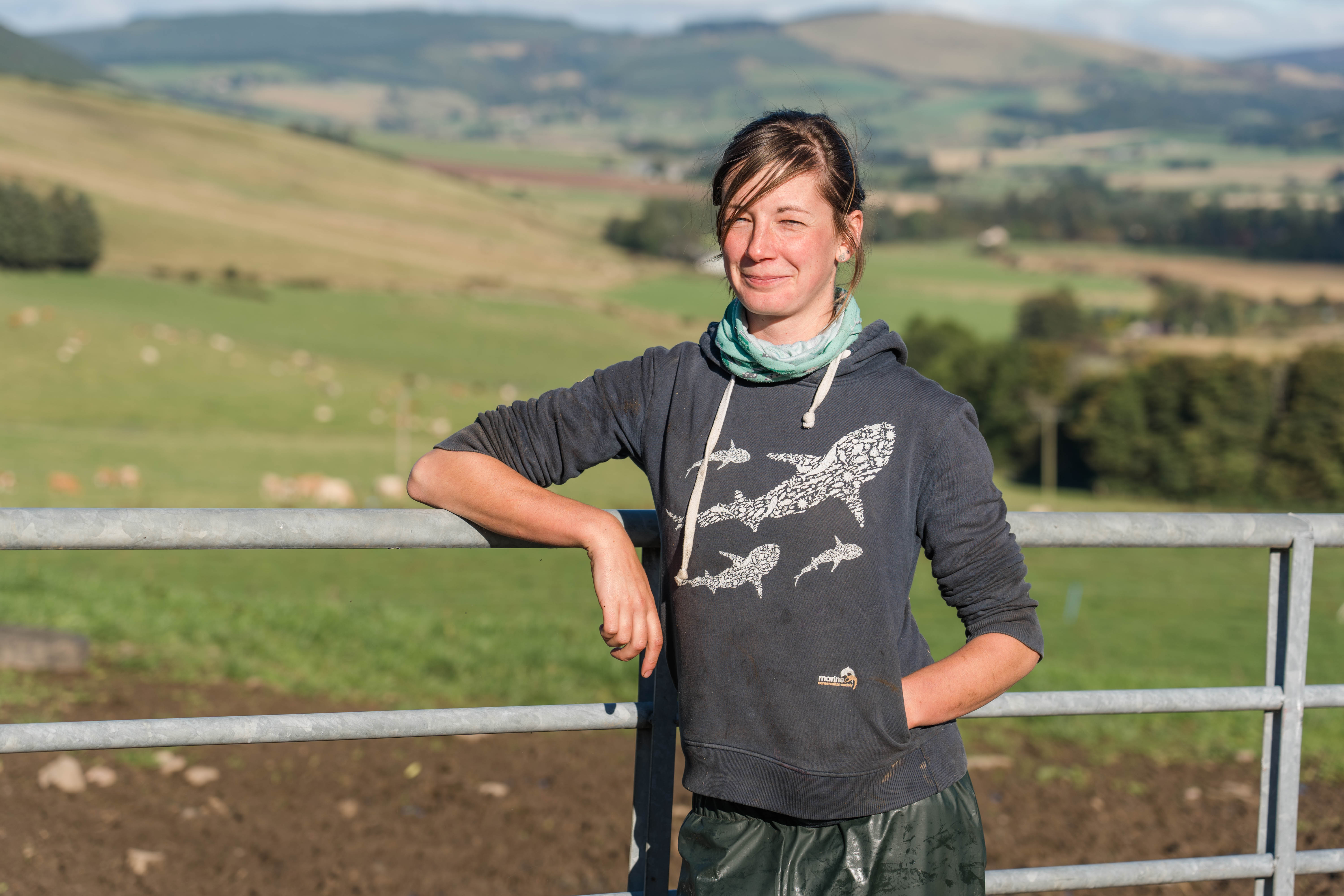
Kirsty Muirden runs an agriculture business called the ‘This Farming Quine’, splitting her time between a 1287 acre organic hill farm and her family’s 700 acre commercial mixed arable and livestock farm. As if that wasn’t enough, she also looks after her own flock of sheep.
Kirsty didn’t follow a conventional route into farming. She spent the first half of her career as a community worker for her local authority and the NHS, but over time realised that it wasn’t giving her the job satisfaction that she wanted. Kirsty had been helping out on the family farm part-time, but in January 2020, she decided to quit her job and take up farming as a full-time job, which was a life changing decision.
Kirsty said: “I had reached a crossroads in my career and it had been in the back of my mind to take up farming full-time, so I went along to a ‘Women in Wellies’ event run by the Cairngorm National Park. I met some like-minded people there who encouraged me to give it a proper go, despite my lack of skills and experience, and since then, I’ve never looked back.”
As fate would have it, on her way home from the meeting, she noticed a sign on a local organic vegetable farm looking for volunteers. Kirsty put her name down and then managed to land a short-term job there, providing her with valuable experience.
She said: “'Working at the vegetable farm allowed me to gain wider experience and opened up other local farming opportunities for me.'
Kirsty has recently been adding to her skills thanks to funding from a practical training fund for women available from the Scottish Government through Lantra. She is currently doing a tractor driving course at SRUC Craibstone and said: “If there’s one thing I’ve learnt about farming, it is that you have to be a Jack of all trades. I’ve learnt so many new skills since I started and I’m only too aware that my learning has only begun.”
She went on to add: “I think the one skill that’s incredibly important is the ability to listen. Farming is such a multi-faceted and potentially hazardous profession and so gaining knowledge from those who have been doing it for years is absolutely vital.”
Over time Kirsty has been building up her experience across all aspects of farming. Her the daily tasks can vary enormously and are very much dependent upon the seasons. She said: “Winter is largely spent feeding and housing livestock. I also do some groundwork on the home farm, clearing parks so we can plough them for sowing the following year”.
“Spring is lambing season and a time for rolling the parks and seed bed after sowing. I also get involved in tagging and ringing calves on the hill farm”.
“In Summer we get the silage pits and carts ready, roll the grass, cart silage, and turn hay. Autumn is mainly about the harvest so I spend a lot of hours carting grain. This is also the time to get things in order sheep-wise for breeding, so there’s a few jobs around that.”
Since changing careers, Kirsty has found happiness and true sense of satisfaction. Although it has been physically and emotionally challenging at times, the chance to work outdoors doing different things has made her move into farming well worth it.
Being self-employed has also been beneficial for Kirsty, providing the flexibility to choose her own path and develop the business in her own way. Kirsty said: “The best part of being self-employed is the flexibility to take your career in the direction you want it to go and play to your own strengths. My business is still in its infancy so I am currently exploring different avenues, but at least I have the freedom to follow the path that’s right for me.”
As Kirsty suggests, being self-employed also comes with its challenges. She said: “It’s definitely less financially secure and you have to be self-motivated to make it work. And, if you’re not working, you’re not earning, so there’s a pressure there. There are also many skills you need to learn to run the business yourself. I find the accounting side a challenge, but I have a friend who is helping me out. One thing I’ve learnt is you mustn’t be afraid to reach out and ask for support.”
Kirsty also talks about the mental health benefits of having a physically active job that gets you outdoors and connected with nature. She said: “I have suffered with poor mental health in the past but now find that being in a job that gets me outside every day, where I am physically active and responsible for animals, has really helped me. I am certainly the happiest I have ever been in a job and whatever happens moving forward, I won’t regret making the leap into agriculture.”
Farming is not for the feint hearted and comes with its fair share of challenges, but as Kirsty describes, the industry offers so much in terms of skills development, job satisfaction and doing something that genuinely feels worthwhile.
She said: “Farming as a career is not an easy choice. It pushes you mentally and physically. You do have to be resilient and there are hard days where you think about giving up. But you will never be bored. You will laugh, cry and experience all sorts of emotions – sometimes in the same day. You will be immersed in beautiful scenery. You will achieve things you never thought were possible. You’ll feel more alive and appreciate the little things more, which is exactly what’s happened to me.”